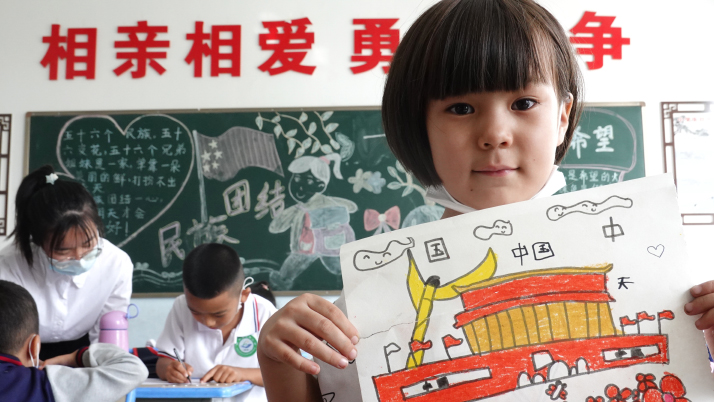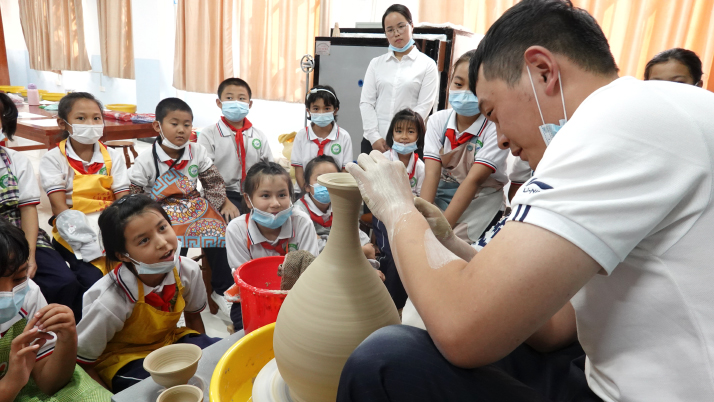| China |
| Local Xinjiang government promises young people a better future by improving education | |
|
|
 A girl displays her painting at the Lishui Primary School (WANG XIANG)
On the afternoon of September 16, 18-year old Nurbigul Tohti sat quietly in the art room of No.4 Middle School of Kuqa, part of Aksu Prefecture in south Xinjiang Uygur Autonomous Region. Her eyes were fixated on the face sketch in front of her. The room was immersed in silence, except for the soft sounds of pencils brushing against the canvas. "I like taking these optional drawing classes. It is a great time to detach myself from the heavy compulsory curriculum studies and it may also help me get into a better university," Nurbigul, a high school senior, told Beijing Review. Her dream university is in Xi'an, a time-honored city with magnificent historical places she often sees on Douyin, the domestic version of TikTok. Like Nurbigul, students in both primary and middle schools are all encouraged to choose several courses related to their personal interests, including calligraphy, drawing and dancing. The courses, taught by professionals recruited by the schools, are free of charge. This is part of Aksu Prefecture's efforts to further improve its education quality. In recent years, local governments across Xinjiang have moved education to the top of their development agenda, aiming to not only give young people a promising future, but also equip them with a moral compass to eradicate the roots of terrorism and extremism.  Yang Chenxing and his students during a pottery class at Lishui Primary school in Xinhe County, Aksu Prefecture in Xinjiang, on September 15 (WANG XIANG)
More than knowledge "We give students the knowledge to prepare them for the gaokao, the university entrance examination, and help them plan for the future. More importantly so, schools and teachers protect them from the influence of extremist thought," Turghun Hasan, a high school teacher at the Experimental High School of Xinhe County in Aksu, said. "Young people mostly lack a comprehensive and objective understanding of their surroundings, which means they need guidance. Most of our students come from rural areas, and their parents often did not receive much education, leading some to get caught in the traps of terrorism," he added. Multiple terrorist attacks in previous years exhibited that the young people of Xinjiang had become a target of terrorist influence. For example, on July 30, 2014, 74-year-old Mullah Juma Tayier, the prestigious and respectable imam of China's largest mosque, the Id Kah Mosque, was brutally stabbed to death by a 19-year-old terrorist—instructed by an 18-year-old "mentor"—after the morning Fajr prayer. According to Turghun, acquiring language skills is another important task for all students at the school, where many students are from ethnic minorities. "As a Uygur myself, I know all too well the importance of mastering standard Chinese (Putonghua). I used to perform poorly in academics because I couldn't fully understand what the teachers were saying," he said. "For Uygur kids, they must learn Putonghua, not just for now but also for their future; their lives are not limited to Xinjiang. Beijing, Shanghai, Shenzhen... If they can speak Putonghua, they will have more choices later on in life." In his high school, students of various ethnicities study and live together, and they speak Putonghua in daily life. The teachers are all fluent in speaking and writing Putonghua. "In such an atmosphere, all of our students have significantly improved their language skills," he said. Free for all Since 2017, south Xinjiang has rolled out its 15-year free education program to lower the number of kids dropping out of school due to family poverty. From kindergarten all the way up to the 12th grade, education is tuition-free and scholarships are granted to students in need. All children of school-going age are required to attend school, including those physically impaired. Gulnazar Tursun is one of them. The 18-year-old was born with a hearing deficiency. "I always wanted to go to school, but it is not easy for me to attend a normal one," she said. "One day, a community worker told my mother about a special school for kids like me, which is completely free of charge, so a few days later, I arrived here." Today, she has been attending Qiming School in Aksu Prefecture for two years, alongside hundreds of other kids, all with some type of physical disability. Juma Aziz, who has been at Qiming for seven years since the age of 14, has not only learned how to read and write braille, but also acquired massaging techniques. Massaging and tuning are two major professions chosen by people with impaired eyesight. In the future, he wants to run a small massage shop. "It has always been my dream to take my parents to Beijing's Tiananmen Square. They can see it for me," Juma told Beijing Review. Stronger together Local government efforts aside, east China's Zhejiang Province has also contributed a lot to Aksu's education development through their partnership assistance mechanism. In August 2019, the Lishui Primary School in Xinhe County of Aksu opened its doors to young pupils. The school was named after its investor—Lishui, a city in Zhejiang. Under the paired assistance framework, the city poured over 60 million yuan ($9.3 million) into the building of this school. In addition to investment, the city also assures the improvement of education quality by encouraging highly experienced local teachers to work at the Aksu school, bringing with them new ideas and teaching techniques. Yang Chenxing is one of them. Having graduated from Jingdezhen Ceramic School, Yang will work as a pottery teacher at the primary school for 18 months. "Lishui is the birthplace of Longquan celadon. By teaching pottery and painting here, I hope kids can learn more about their cultural heritage," Yang said. Besides Yang, the teachers of calligraphy and seal cutting, too, hail from Zhejiang, adding to the variety and quality of courses. But Yang will eventually leave, just like many other Zhejiang teachers at the school. To keep the course running on the long term, he not only teaches his students, but also his Xinjiang colleague Ma Ruili. "I cherish every opportunity to learn from Mr. Yang. When he leaves, my goal is to continue making the pottery class interesting for kids," Ma said. "We set up the paired program to ensure the sustainability of our varied courses. The teachers may come and go, but the courses will continue," Wang Yuhong, principal of the school, concluded. (Reporting from Xinjiang Uygur Autonomous Region) (Printed edition title:Aksu Hits the Books) Copyedited by Elsbeth van Paridon Comments to wenqing@bjreview.com |
|
||||||||||||||||||||||||||||
|